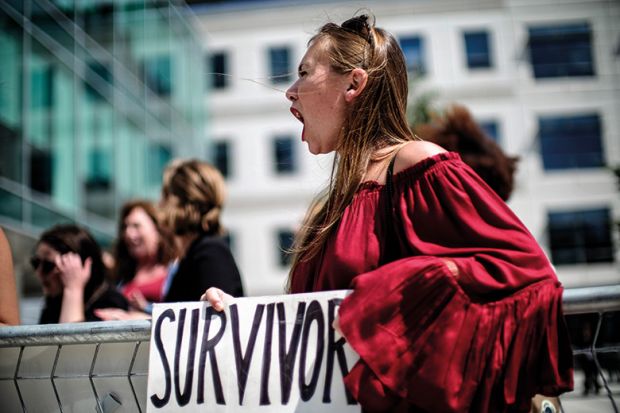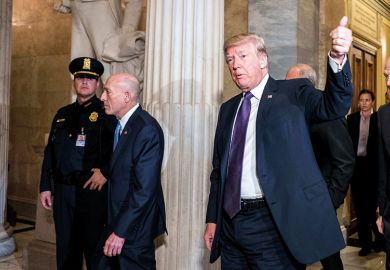Even by the standards of the daily cascade of chaos that has come to characterise the American news cycle, the nation’s universities have suffered a semestris horribilis.
One public system was alleged to have doctored graduation rates. Stanford University’s Graduate School of Business purportedly misrepresented how it was awarding scholarships. Some of the wealthiest higher education institutions were reported to have hidden assets offshore to avoid paying taxes on them. There were also charges of bribery by athletics programmes. And countless institutions were caught up in the tsunami of sexual harassment accusations.
“We have wandered into – not to be trite – a perfect storm,” said John Thelin, professor of educational policy studies at the University of Kentucky and author of A History of American Higher Education. “Controversies or scandals have always cropped up from time to time, but the confluence of them right now is pretty remarkable.”
For universities, it’s also very badly timed. Faith in higher education in the US is already in decline, according to a litany of polls.
US university enrolment has also fallen, down by nearly 10 per cent, or 2.4 million students, from its peak in 2011. And Congress is considering significant changes to tax law and other policies that universities say would hurt their ability to raise money and recruit new undergraduate and graduate students. Meanwhile, bond-rating agency Moody’s this month downgraded the financial outlook for the US higher education sector from “stable” to “negative”, citing “potential [federal] policy changes”.
Universities have lobbied in their own defence, saying that they need a continual flow of taxpayer funding to help educate their students. But that has been a tougher argument to make since the Paradise Papers showed that some of the most elite institutions – including Columbia, Dartmouth and Stanford universities – were stashing portions of their billions in endowment money in Caribbean accounts. This not only spared them paying tax on that portion of their investment income that was subject to it; it hid their holdings in fossil fuels and other businesses that could potentially attract criticism on their campuses.
“They’re not acting like educational non-profit organisations. They’re acting very differently,” said Professor Thelin. “And that is going to raise eyebrows.”
This comes just as Republicans in Congress have suggested taxing the parts of the biggest university endowments that are not currently subject to taxation.
Meanwhile, a student at the Stanford Graduate School of Business stumbled on to unprotected personal information about applicants showing that, contrary to the school’s assertions, it was offering financial aid not just to people who couldn’t afford to attend the university, but as a way of attracting the most desirable prospects who could afford to pay.
The university responded by saying that it was trying to lure “candidates whose biographies make them particularly compelling and competitive in trying to attract a diverse class”. But the controversy played into widening anger over higher-income Americans getting benefits perceived to be meant for lower-income citizens.
“There’s just a greater awareness and general re-evaluation taking place in broader society on a lot of these issues, and in almost every way higher education is a Petri dish for this,” said Sean Rossall, chief executive officer and managing partner of the media relations consulting firm Dick Jones Communications, which works with many universities.
News of other alleged misdeeds has come fast and furious.
The City Colleges of Chicago system of two-year community colleges allegedly conferred second degrees to students who didn’t ask for or expect them, according to an investigation by the Better Government Association, an investigative journalism non-profit organisation. This and other questionable steps substantially inflated its apparent success rate.
The system disputed the findings. But among faculty, their union president said in a letter to the chancellor, “there certainly was an overwhelming belief that data was being manipulated”.
Union head Tony Johnston said that there was another problem with such embarrassing disclosures. “This plays directly into the hands of those who wish to eliminate or defund public education by giving them evidence of incompetent, if not corrupt, leadership,” he wrote.
US universities also haven’t been spared from the spreading plague of sexual harassment allegations and several institutions stand accused of having tried to cover up such cases. The University of Rochester, in New York state, for example, is under fire from critics who allege that it cleared a known harasser on the faculty while retaliating against his victims. The university said that it had not been able to substantiate the original complaints.
At the prestigious Berklee College of Music, in Boston, Massachusetts, no fewer than 11 faculty members in the past 13 years have been fired for alleged sexual harassment, the university confirmed after The Boston Globe reported that several people were allowed to leave quietly, while the students who came forward to speak out against them were silenced with gagging orders.
What universities can do about this bad press, Mr Rossall said, is to confront it.
“It’s a warts-and-all-type moment,” he said. “We need to get back to being rigorously open [about] why higher education matters [and] why research matters to our society.”
Not coincidentally, he said, university administrators need to better consider the public relations repercussions of the choices they make.
“Communications,” said Mr Rossall, “shouldn’t be an afterthought.”
POSTSCRIPT:
Print headline: ‘Confluence of scandals in the US right now is remarkable’
Register to continue
Why register?
- Registration is free and only takes a moment
- Once registered, you can read 3 articles a month
- Sign up for our newsletter
Subscribe
Or subscribe for unlimited access to:
- Unlimited access to news, views, insights & reviews
- Digital editions
- Digital access to THE’s university and college rankings analysis
Already registered or a current subscriber?








